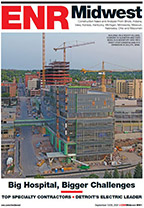
Although Detroit's Chapter 9 bankruptcy filing on July 18 is the largest in U.S. history with about $18 billion in liabilities, it is not expected to affect several key urban projects, project officials say. But state contractors are concerned about work even with some funding tied to private investors.
The city's proposed $650-million arena for the Red Wings hockey team would be supported by $367 million in private investment and $283 million in public funding, says a statement from developer Olympia Development. The public contribution would come partially from a state economic development fund and from property taxes collected by the Detroit Downtown Development Authority.
"Property taxes, even though collected by the city, are not impacted, either," says Bill Nowling, a spokesman for Detroit Emergency Manager Kevyn Orr, who has been overseeing the city's finances since March. The authority is listed as one of Detroit's 20 largest unsecured creditors, according to the U.S. Bankruptcy Court for the eastern district of Michigan, Detroit. The city owes the authority about $33.6 million, although further loan details were not disclosed. Also apparently shielded is a $137-million streetcar line, according to a local press report.
Another signature downtown project, the $279-million upgrade of the Cobo Center exhibition and event space, is being managed by the Detroit Regional Convention Facility Authority, a regional and state entity. "Cobo receives no funding from the city government for either the capital project or our day-to-day operations," says agency CEO Patrick Bero. "The capital project is fully funded through a private-placement bond financing provided by a consortium of banks." Work is now 60% complete at the center, which is set to host in January the giant North American International Auto Show, which could attract up to 800,000 attendees, he says.
"Detroit is open for business, despite the city government's financial troubles," says Larry Alexander, CEO of the Detroit Metro Convention & Visitors Bureau. He notes the opening, earlier this month, of a 367-room Crowne Plaza hotel downtown. Under the restructuring proposal, the city will spend $1.5 billion more over the next 10 years on public safety, according to Alexander.
But the Associated General Contractors of America-Michigan awaits clarification on whether the city has funds in place to execute other current and planned projects. "At this point, there are a lot of question marks," says President Bart Carrigan. "Detroit isn't enjoying a heyday of public construction, so the hope is it can continue to manage projects it has under way." AGC-Michigan will lobby to ensure industry interests are represented if the U.S. Justice Dept. appoints a committee of unsecured creditors for the case. "There are so many layers to this, including contractors, subcontractors and suppliers," Carrigan points out. "Like a Chapter 11 bankruptcy, the goal is to communicate the industry's unique needs to decision-makers."






Post a comment to this article
Report Abusive Comment